
The fastest-growing company in Fairfax County is a Tysons-based cybersecurity firm whose stated goal is to “fundamentally change” how organizations get technical expertise.
MOXFIVE claimed the 39th spot overall and the top spot for the security industry on the latest Inc. 5000, an annual ranking of the country’s most successful privately owned companies based on their revenue growth.
This is Moxfive’s first time on the prestigious list, and among the 120 Fairfax County companies that got included this year, it has the highest ranking, according to the Fairfax County Economic Development Authority.
“Our overall and security industry rankings on the Inc. 5000 list are an acknowledgement of our team’s determination and success in maintaining an unwavering commitment to changing an industry by obsessing over delivering a superior customer experience,” MOXFIVE CEO and founder Mike Wager said in a press release. “Appearing on the Inc. 5000 list is also validation that our Platform…is the future of the industry.”
Founded in 2019, Moxfive describes itself as a specialized technical advisory firm that assists other businesses with responding to cyberattacks and bolstering their information technology capabilities.
Headquartered in The Plaza at Tysons Corner Center (1751 Pinnacle Drive, Suite 600), the company has seen its revenue grow 9,622% over the past three years, according to the 2023 Inc. 5000. It was also included on Inc.’s 2022 Best Workplaces list.
In a comment to the FCEDA, Wager lauded Fairfax County as “a fantastic area” to raise a family and start a business.
“We have been fortunate to achieve a great deal of success and I attribute much of that to the business environment in Fairfax County, which includes a tremendous amount of cybersecurity talent,” he said. “This has allowed us to find the people we need more easily and scale more quickly.”
Per the economic development authority, Fairfax County had 15 companies in the top 500 of this year’s Inc. 5000 and accounted for 44% of the 274 Virginia companies to make an appearance. The top 500 companies were featured in Inc. Magazine’s September issue, which hit newsstands on Aug. 23.
Last year, the county had 113 companies make the rankings, led by Integrated Managment Strategies — a Springfield-based small business consulting firm — at no. 76.
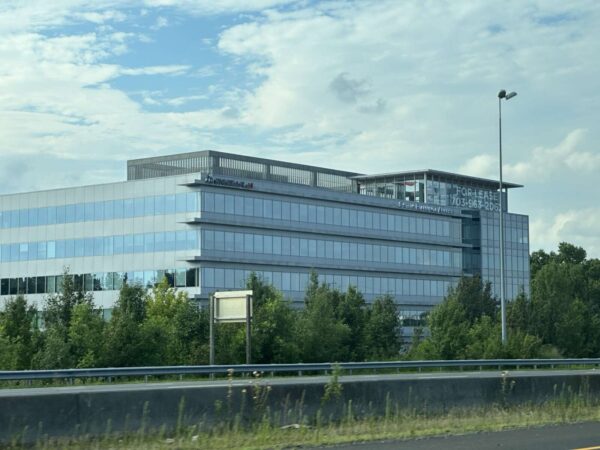
(Updated at 9:05 a.m. on 7/26/2023) Fairfax County is currently the second largest suburban office market in the nation, with an inventory of 120 million square feet.
However, the current office vacancy rate sits at 16.7% — topping the county’s previous 10-year high, according to Stephen Tarditi, director of market intelligence at the Fairfax County Economic Development Authority.
He called the office market “a lagging economic indicator” when presenting the data last Tuesday (July 18) to the Board of Supervisors economic advisory committee.
Despite the county’s vacancy rate, Tarditi said the demand for office leasing is increasing.
“Last year, we had 6.6 million-square-feet of office space leased, so we’re 37% below our pre-pandemic average,” he said. “And comparing that to 2021, we were about 4.5 million square feet.”
Almost half of the county’s office inventory was built before 1990, and Tarditi said the county is seeing a bifurcation in its office market, where older buildings are not being leased at the same rate as newer buildings.
Almost 5.9 million square feet of office space is slated to be demolished or converted into another use, most of it built before 1990, according to the presentation.
“The class B, class C inventory — that’s not seeing your net new tenant demand. It’s your trophy office buildings. In fact, the trophy office vacancy rate for Fairfax County is right around 10%, which is very healthy,” Tarditi said.
According to the data, coworking space is another strong sector in the office market, with demand increasing among more small businesses.
“I think more and more building operators — if there is vacant space and newer buildings — they’re looking to incorporate coworking space and have them graduate in that space,” Tarditi said.
National economic indicators that could have a potential effect on the county’s office market include mass layoffs and interest rates. Although the county is seeing a high vacancy rate, Tarditi highlighted some statistics that could indicate growth in office demand in the future.
Fairfax County now has 42,000 employee establishments (companies with employees and payroll) — a record number for the county, according to Victor Hoskins, CEO of the Fairfax County Economic Development Authority.
“That shows that there would be future office demand as a new company is established,” Tarditi said.

After introducing itself earlier this year with a website update and some cherry blossom-related events, the Tysons Community Alliance is now digging into the area’s strengths, needs and what needs to be done to set it up for future success.
Picking up where the now-defunct Tysons Partnership left off, the nonprofit community improvement organization launched a strategic planning effort for Tysons this week by convening a series of work groups that will focus on different topics, such as residential development, transportation and parks.
The strategic plan will serve as an update on the current state of Tysons and a guide to implementing Fairfax County’s Tysons Comprehensive Plan, TCA Board of Directors Chair Josh White told the Board of Supervisors at an economic initiatives committee meeting on June 13.
“One of the key purposes of the alliance is to help catalyze the continuing transformation of Tysons into a walkable, urban center and community,” White said. “…It is our intent to facilitate a community engagement process with a lens focused on diversity, inclusion, equity, and sustainability, which will chart a future direction for Tysons and help shape an action agenda.”
As part of the planning process, the TCA is conducting a conditions assessment and market study that will provide data on economic trends and gaps to support the future strategic plan as well as a new Tysons database.
Acting TCA CEO Richard Bradley — who will soon give way to the first permanent CEO, Katie Cristol — described the database as a more comprehensive version of the Tysons Tracker that the county launched in 2021, sharing information about all things Tysons, from population data to office usage.
Underway since April, the market study is slated to be finished around mid-July, per the presentation. But statistics shared by TCA leaders reinforced the oft-repeated refrain that Tysons is the county’s “economic engine,” while also exposing potential challenges to its ambitions.
Despite encompassing just 1% of the county’s total land area, Tysons accounts for 17% of its jobs, 10% of all retail revenue and 8% of tax revenues, White touted.
As reported to the Fairfax County Planning Commission in January, about 30,124 people now live in Tysons — a 96% increase from 2010, when the comprehensive plan was adopted. Like the county as a whole, the area has a “minority-majority” population, and while 29% of residents earn salaries of $200,000 or more, 38% have incomes of $100,000 or under — a larger percentage than in the overall county.
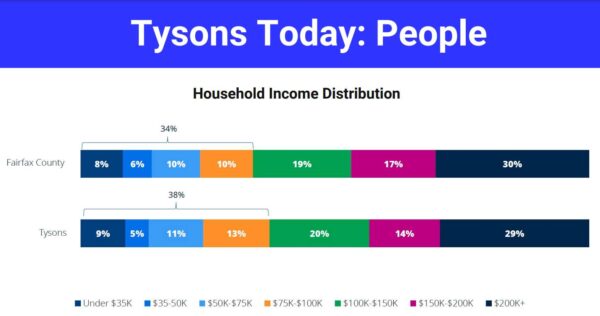
Some supervisors expressed surprise at those numbers, noting that affordable housing will be critical for maintaining the area’s “economic diversity.”
“I think we all hear Tysons or we hear McLean or we hear Oakton or we hear Falls Church or Alexandria, and we have these preconceived notions of who lives there and what does the community look like and what do the businesses look like,” Providence District Supervisor Dalia Palchik said. Read More

Fairfax County wants to bridge the gap between employers and qualified talent through a work-based learning opportunity initiative.
Talent Up will match local employers facing hiring challenges with qualified talent through paid temporary-to-permanent work-based learning internships, staff explained to the Fairfax County Board of Supervisors at an economic initiatives committee meeting last week.
According to the presentation, Talent Up will offer a variety of solutions to employers facing hiring challenges:
- Targets hard-to-fill, entry-level professional gateway jobs
- Repositions work-based learning as low-risk temporary to permanent hiring on-ramp
- Incentivizes employer participation by underwriting work-based learning wages
- Advises employers on revising job descriptions to focus on skills-based hiring, increasing the pool of qualified applicants by up to 50%
- Easy access to hundreds of candidates via talent development partners
“There’s a lot of movement going on in the workforce space right now — movement towards skills-based hiring, and we believe that this can dramatically accelerate that movement,” Bill Browning, workforce innovation manager at the Fairfax County Department of Family Services, said of the initiative.
The focus will be on gateway jobs such as information technology specialists, accounting clerks, sales representatives, and office administrative support.
“These are entry-level professional jobs, where there’s reams of data showing that they’re great springboards for future advancement and career advancement for candidates,” Browning added.
According to his presentation, Fairfax County had more than 67,000 job openings in May of this year, and 71% of employers in Northern Virginia reported it being more difficult to fill jobs now than last year, or even just a few months ago.
The initiative will also address what Browning called the “missing middle.”
“We’re looking at middle-skilled jobs that require some skills beyond high school, but perhaps not a college degree,” he said. “And we’re also looking at some of those midsize employers that don’t have some of the advantages large employers have.”
How it works:
- Business outreach: Initial focus on small to medium-sized employers
- Advise: Address hard to fill occupations and sponsor new temporary-to-permanent internships
- Match: Talent partners’ referrals to generate qualified candidates to interview
- Choose: Employers select interns
- Support: Coaching and training support during internship to increase success rates
- Success: Convert internships into full-time offers or place interns into new jobs
Theresa Benincasa, manager of economic mobility with the Fairfax County Department of Economic Initiatives, said the plan is to get started right away with the board’s approval.
“We’re going to just go ahead and do a launch event in the fall with board approval. We’ll start doing events with workers to communicate, we’ll do some one-to-one engagement,” she continued.
To be eligible for Talent Up, employers must have a physical presence in Fairfax County and be ready to establish a work-based learning internship.
Job seekers must be county residents, meet the skills requirements of an open internship and be impacted by pandemic-related unemployment, underemployed or seeking greater economic mobility.
Board of Supervisors Chairman Jeff McKay voiced support for the initiative, saying it builds resilience.
“If you can help some folks move into these jobs, not only do we help our employers, we help those individuals. But it’s a resilience thing where their lives can change dramatically for the better,” he said.
The program will seek the board’s approval at the July 11 meeting.
Photo via Eric Prouzet/Unsplash

The Town of Vienna’s first-ever restaurant week must’ve been a success, because the celebration of the local dining scene is coming back even bigger than before.
Vienna Restaurant Week will return for 10 days from March 3 through March 10 with about 50 restaurants, cafes and other eateries participating — over twice as many as in 2022, according to Vienna Economic Development Director Natalie Monkou.
“This year, Vienna Restaurant Week will bring more participation and excitement directly from our business community — where thoughtful menu design and a welcoming atmosphere to our visitors and residents is already palpable,” Monkou said in a statement.
Similar to the Restaurant Association Metropolitan Washington’s ever-popular, bi-annual restaurant week, which showcases the D.C. region’s dining scene, participants in Vienna’s campaign will offer set, three-course menus for brunch, lunch and dinner.
The brunch and lunch menus will cost $25, while dinner will be $35 to $40 per person. Discounted a la carte dishes will also be available, along with dine-in, takeout and delivery options.
The event is being sponsored by Vienna’s economic development division, which says it’s intended to “expose” local residents and visitors to the town, boost patronage for each participant, and “increase brand recognition” for both the restaurants and the town.
“The economic pressures that we have seen and experienced since the pandemic and continuing into this year remind us how important it is to support our local businesses and shine a spotlight on the Town’s food and beverage industry,” Monkou said.
The town encourages diners to keep up with the campaign by following the economic development division at @ExploreViennaVA on Instagram and Facebook. The hashtag #ViennaRestaurantWeek will be used to promote the event.
Participants range from long-standing staples of the town’s culinary scene, like The Virginian and Caffe Amouri, to newcomers like Akai Tori Ramen and Yakitori, which opened just last month. There are also a few restaurants from outside the town’s limits, including Settle Down Easy’s Oakton tasting room and Kusshi Ko in Tysons.
A full list can be found on the Vienna Restaurant Week website.
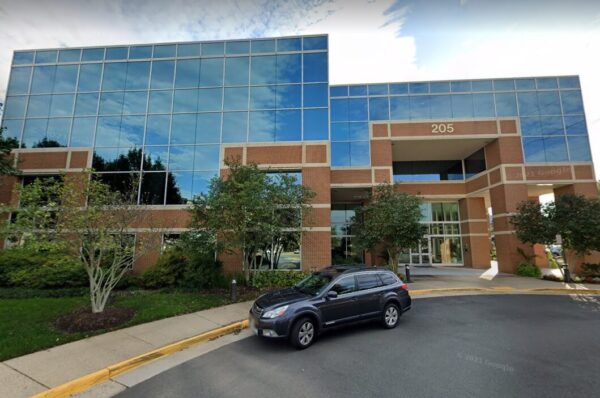
A new economic development hub is officially open in the Town of Herndon.
The George Mason Enterprise Center has opened in Office Evolution, a shared office space, at 205 Van Buren Street to support small and emerging businesses in an effort to support Herndon’s economic growth.
A ribbon cutting is slated for March 16, though the center has already begun providing services, a spokesperson for the center told FFXnow.
The town is the fifth locality to partner with the George Mason University center, which offers services like business advisory sessions, educational workshops, and training on other federal and state programs.
“We are thrilled to continue the success of the Mason Enterprise Centers with this expansion by bringing Mason assets directly into the Herndon business community,” said Paula Sorrell, Mason’s associate vice president of innovation and economic development.
The center will also grow its services, including providing access to health insurance, payroll support and other business-related services. Patrons will have access to Mason classroom and research projects, as well as capstone students and interns.
“We are delighted to partner with the Mason Enterprise Center and Office Evolution in creating this space for businesses to grow and prosper,” Herndon Mayor Sheila Olem said. “We look forward to welcoming many new enterprises to the town as a result of this collaboration.”
GMU’s other enterprise centers are in Leesburg, Fairfax, Warrenton, and Springfield.
Photo via Google Maps

A South Korean company that makes cheese out of almond milk hopes to ramp up its U.S. presence, starting with an expansion of its American headquarters in Tysons.
Armored Fresh has committed $125,000 to expanding its offices at 1765 Greensboro Station Place with 27 new marketing and sales employees, Virginia Gov. Glenn Youngkin announced today.
The expansion will enable the company to increase its footprint in the U.S. through both online sales and brick-and-mortar stores, according to the news release.
“It is gratifying to support the growth of an international company like Armored Fresh, whose success further strengthens Virginia’s standing as a prime global business destination,” Youngkin said. “The company is advancing food technology with its vegan cheese products, and we are proud that this industry innovation is happening right here in the Commonwealth.”
According to Youngkin, Virginia beat out California, Maryland, D.C. and New York to retain Armored Fresh.
Established in 2021, the company claims to be the first in the world to commercialize almond milk-based cheeses. Its cheese is sold in cubed, sliced, shredded and spreadable forms. All products are free of cholestrol, dairy, gluten and genetically modified organisms, according to its website.
The company made its U.S. debut in September, introducing its products to 100 grocery stores in New York City. An official global launch event was held on Oct. 24, and online sales are set to begin this month.
Per Youngkin’s office, the Virginia Economic Development Partnership worked with the Fairfax County Economic Development Authority to keep Armored Fresh’s headquarters. The Virginia Jobs Investment Program will provide consulting services and funding to support the planned new jobs.
In a statement, Armored Fresh CEO Andrew Yu noted that Fairfax County has “a rich history” in the dairy industry. The county was once home to more dairy farms than anywhere else in Virginia, a legacy kept alive at historic sites like Frying Pan Farm Park and Historic Blenheim.
“Armored Fresh is very excited to bring great-tasting, zero-dairy cheese that everyone can enjoy,” Yu said. “…Northern Virginia and Fairfax County has a rich history in dairy and is advancing in tech innovation. We’re glad to make Fairfax County our home and be part of the vibrant business and innovation community.”
State and local officials alike praised the news: Read More
Developers are asking for public help to redevelop the Huntington Club condominium community, but officials worry the condo owners are unclear of the risk involved.
At an economic initiatives committee meeting on Dec. 13, the Fairfax County Board of Supervisors got an update on phase one of the redevelopment and what’s needed financially to get it underway.
Currently, the Huntington Club is a 364-unit condo complex between N. Kings Highway and Huntington Avenue, adjacent to the Huntington Metro station. A three-phase plan to redevelop the 19.5-acre property to be denser was approved in December 2021, promising 2,000 multifamily units, 200 townhomes, and multi-use space for retail, senior living, and possibly a hotel.
The redevelopment would be a major complement to a development plan for the Metro station area, which is also in motion, developers argue.
However, the land owners don’t have enough upfront cash to start the townhomes and multifamily units envisioned for phase 1 of the project.
“The [land owners] are insufficient cash-wise to cover infrastructure costs for phase 1,” Fairfax County Debt Coordinator Joe LaHait told the supervisors at the meeting.
Because they don’t have the funds needed to cover infrastructure, if the county doesn’t step in, the redevelopment won’t be able to move forward, LaHait reiterated. Hence, developers are asking for help in the form of $45 million worth of publicly issued bonds.
The county has started down the path toward fulfilling the request, but it’s proposing to take a somewhat unique approach.
The county would establish a community development authority (CDA) to borrow the money. A CDA is a public entity governed by a board with the power to issue bonds. This mechanism was used to help get the Mosaic District built over a decade ago.
The CDA would pay back the $45 million in bonds through tax increment financing (TIF), which is the difference between taxes generated before and after redevelopment. Once the bonds are paid back, the county can keep the extra money.
Right now, the Huntington Club pays the county about $800,000 in tax revenue, per the Washington Business Journal. The redeveloped property could generate upwards of $10 million annually.
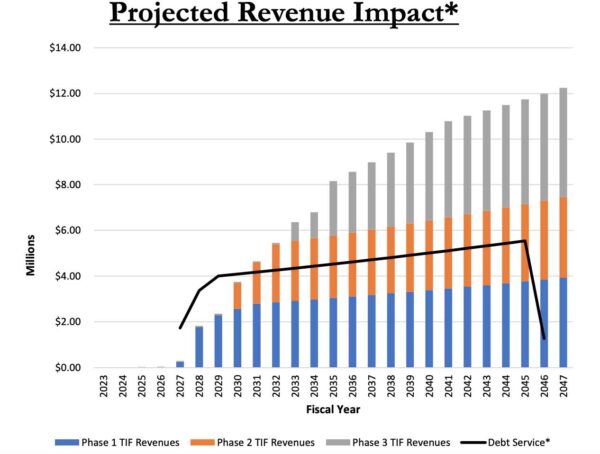
While the county board needs to approve the CDA’s creation and the issuing of the bonds, what’s enticing is that significant extra money and the fact that the county wouldn’t be on the hook if values don’t rise as quickly as hoped.
The condo owners are the ones who would assume the risk. Read More
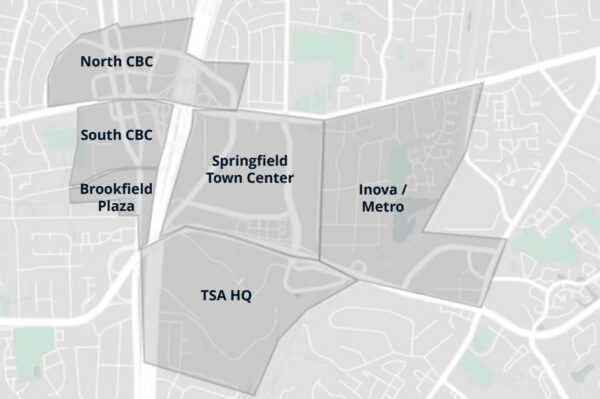
A decade after Springfield Mall was torn down, reemerging two years later as Springfield Town Center, Fairfax County officials are still trying to figure out how to make the reality of the development match that rebranding.
Progress on transforming downtown Springfield from a commercial hub into the more mixed-use, walkable environment envisioned by county planners has been slow, even nonexistent when it comes to housing, a recently released study found.
In fact, the area hasn’t added a single multifamily residential unit since the Springfield Crossing apartments were built in 2001, according to the Springfield-Franconia Market Study commissioned by the Fairfax County Economic Development Authority (FCEDA).
“That’s insane,” Franconia District Supervisor Rodney Lusk said. “Think about it for a second. Every market has had some sort of residential construction. We have had zero. So, that’s something that we have to obviously think about and figure out where we might allow more residential options…in the areas that make up the Franconia-Springfield market.”
Attributed at least in part to lower rents compared to areas like Tysons or Bethesda, the lack of housing isn’t the only challenge facing downtown Franconia-Springfield, which is concentrated around the I-95 and Old Keene Mill/Franconia Road interchange.
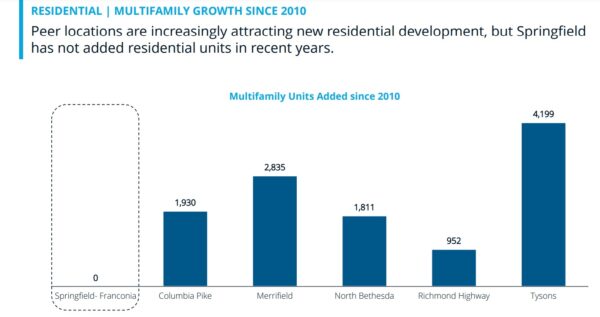
According to the study, which was conducted by the consultant HR&A, Springfield has 3.2 million square feet of retail development, 2.7 million square feet of office space, 978 multifamily units, 1,843 hotel rooms, and 0.3 million square feet of industrial space.
While the existing shopping centers, including the town center, are performing well overall, retail growth has slowed with just 22,000 square feet added since 2010, and vacancies have jumped to 6.4% during the pandemic.
Covid also drove up vacancies in the office market, where the rate climbed from 13% pre-pandemic to 19% as of early 2022, and sent hotel occupancy rates tumbling from 73.7% in 2019 to 28.4% in 2020 before bouncing back to 51% this year.
Aside from industrial construction, which has stalled since 1988, the study projects room for growth across all markets over the next 10 years, including 1,000 to 1,600 multifamily units, but mixed-use development is necessary to achieve that potential.
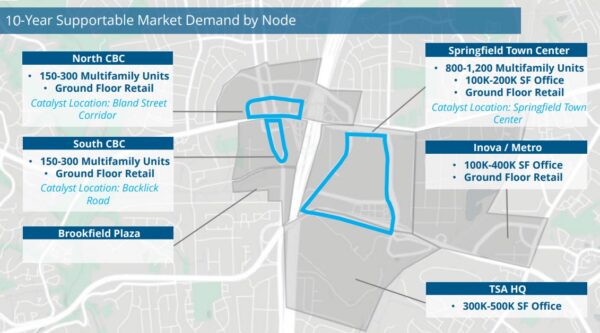
“There have been significant private investments in Springfield, most notably at Springfield Town Center and the TSA headquarters,” the report said. “However, growth has been focused on site-specific investments, not mixed-use development supportive of County goals or catalytic growth.”
Mixed-use development would require not only more housing, particularly mid-rise buildings less than eight stories tall, but also amenities and public infrastructure to draw residents, workers and the tourists that the study says are needed to offset declining business travel. Read More
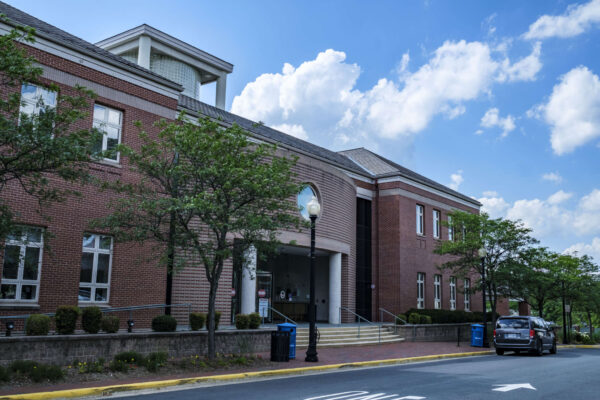
The Town of Herndon is exploring the creation of a new business incubator.
The project is intended to promote e-commerce and establish the town as a tech-savvy area.
Partnerships could include George Mason University, Virginia Small Business Development Center, and Office Evolution, an office space rental agency based in Herndon. Overall, the incubator would offer education and training for entrepreneurs and small business in an effort to boost business growth and overall independence.
The project is in the early planning phases.
“The Town Council has not yet adopted a resolution authorizing the incubator project; that is anticipated to come before the council at its December meeting,” town spokesperson Anne Curtis wrote in a statement to FFXnow.
At a meeting in mid-October, the town council explored the possibility of the project.
Office Evolution would act as the incubator for the project. Mason Enterprise Center Services, a business development service affiliated with GMU, would offer programatic support, including access to its mentor team, discounts for recruiting and payroll services, and access to capstone students and interns.
The project could also include counseling and training services, along with information on marketing, sale, financing and financial management.

